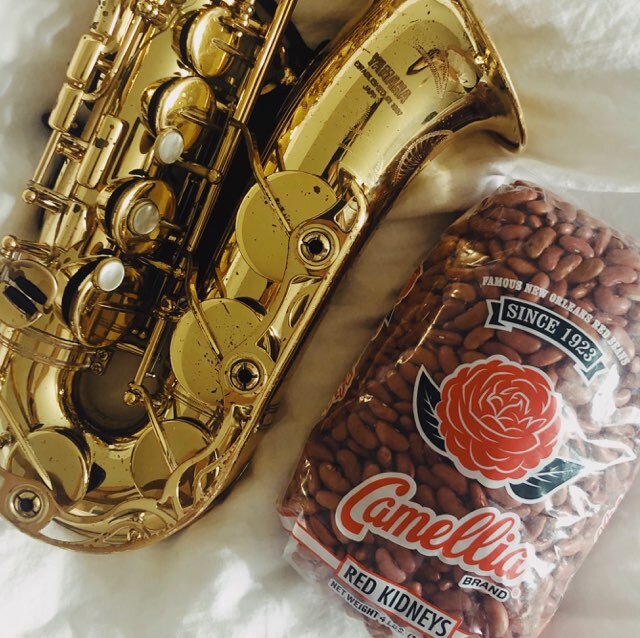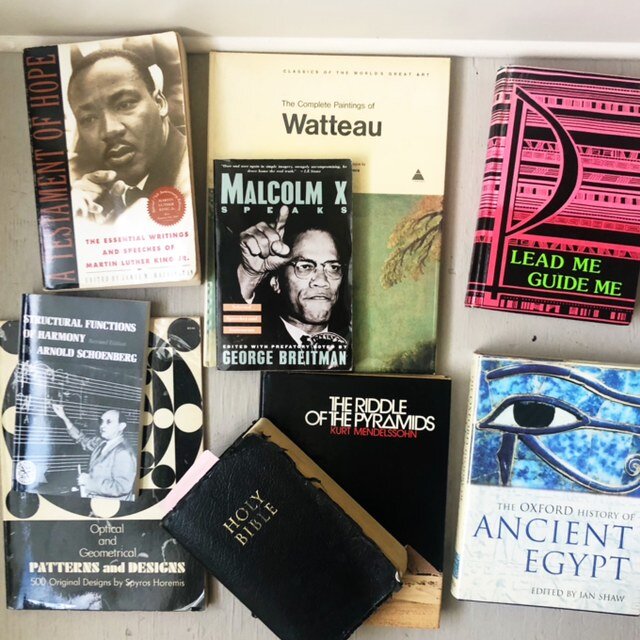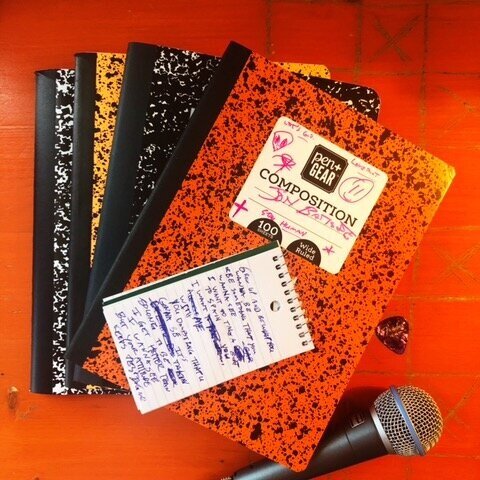No 1. The Art of Failure - Jon Batiste
Interviewed by Suleika Jaouad
Photo courtesy of Jon Batiste
This interview is excerpted from Suleika’s Studio Visit with Jon Batiste on August 9, 2020. Studio Visits is a conversation series with extraordinary artists where they share stories, failures, wisdom and instruction, and also give us a behind-the-scenes glimpse at their workspaces. It’s a benefit for paid subscribers of Suleika’s newsletter, the Isolation Journals.
When I decided to start this conversation series, it felt only appropriate to have Jon Batiste as our first guest. Some of you may know him from his journaling prompts, and even more of you likely know him as the world-renowned musician and bandleader for The Late Show with Stephen Colbert. But to me he’s just Jon—or, when I’m annoyed with him Jonathan—aka my partner in crime and creativity. I’ve learned more from Jon about the creative process than anyone else, and I’m so excited for him to share some of that wisdom with you.
SULEIKA
I think some people would be surprised to learn that you are a deeply shy person. Can you talk about how you developed your confidence—not only as a human being but also in your creativity?
JON
Confidence comes from realizing there will never be another you. You are the only version of you that exists. If you listen to the greats—and there are so many—and you hear how amazingly they approach the craft, and you try to imitate that, you’ll fall short. You can’t sound like Nina Simone or Bach. They got there after a lifetime of searching. It takes a lifetime, and even then, you will never sound like them.
Then you look at your peers and their talents, and it’s natural to feel that their talents are better than yours—because you can’t do what they do. You start to think, “Why can’t I be more like everyone else?”
That’s the entirely wrong path. You should actually be digging into the things about you that you can’t change—because those are the things that will ultimately breed your greatness. Those are the things that only you have access to. You have been the only person who is born in this time with your brain and your family and all your experiences, your names, your ideas, and your whole perspective on everything that’s come before will inform all your built-in wonderful gifts. Ultimately digging into the idea that you’re the only you who will ever exist is what gives confidence.
It isn’t an easy process. You have to be willing to sound and look bad and fail before you figure out how you’re going to put together these elements. Because there is no model. There are only inspirations.
SULEIKA
Will you tell us some of those early stories of failure?
JON
Yeah, of course, I’ll share. The thing that I learned from failing is that failure is not actually that bad. You think you’ll fail and you won’t survive. But I’ve failed so many times—in fact, failing became a part of the culture of our band. We had a saying in the band. We said, “Get your rejection in.” You will fail before you figure it out. There will be endless failures. I’m still failing. If you’re not failing, you’re not really trying.
SULEIKA
I remember when a friend of ours got a rejection letter she was upset about, and you very generously shared with her a rejection you got from a major record exec.
JON
Yeah, yeah. This is back when I was transitioning from playing jazz clubs in New York City as a teenager to, in my early twenties, going into a broader space in the music and entertainment industry. I was meeting a lot of record executives who were gatekeepers to these other aspects of the music industry. And after one meeting, a friend of mine received an email by mistake from this executive, and my friend forwarded me the email, which was this executive breaking down all the reasons I would not succeed outside of being a jazz accompanist.
I had that email framed. It’s a reminder to me that even when you’re successful, everyone will not like you. In fact, the more successful you become, the more people will probably not like you. And the people who like you and those loved ones and your whole community becomes that much more important. Because there’s so many different ways of thinking and philosophies and belief systems in the world, that you will never align with everybody. You will never please everybody.
Ultimately you have to connect with those people who multiply your energy. Place your energy where it will be multiplied. Most people, when they see you, they’re seeing you through the filter of their failures or things they couldn’t achieve. Or they’re seeing you through the filter of, “Oh, this is what people like him or her are like.” They don’t realize that you’re the only version.
SULEIKA
We received a question for you from Laura, a member of our Isolation Journals community. She says, “My biggest challenge is moving beyond the ‘not good enough’ rut. I fall into it so easily, and I have done it as an educator, a mother, a wife, and so on. It’s exhausting. Any tips?”
JON
Not good enough is the thing that others will tell us, or we’ll tell ourselves, not realizing our value. But nothing we create is ever in that category. There’s a use for everything under the sun. There’s a use for everything in the universe. And when we’re putting ourselves out there, and we’re comparing it to other things, it becomes hard to see the value in the thing that we have actually created.
But your value isn’t how much what you do is like something else. You just have to keep creating. It’s like exercise. Anything that you do that is strenuous, you don’t want to keep doing it. And it doesn’t really get easier, but you start to see the value in it. It’s like running or lifting weights—at the very beginning, you don’t want to keep doing it. But if you keep doing it, you get stronger, and you continue to get stronger and stronger and stronger and stronger, and then you start to get to the point where you have a handle on it.
Also surround yourself with people and feed yourself with energy that is good for you. Community and positive affirmation is important. And keep watch for the energy vampires. Put your energy into the people who multiply it.
SULEIKA
So can you tell us a little about how you got started? You’ve told me you started on drums and that you were the least talented person in this musical family that you grew up in. I find that so interesting—this idea that you can be trying something, but it’s not fully working, and you have to adjust or redirect to find your groove.
JON
I switched from drums to the piano at 11, and that’s when things began to click. The piano was my mother’s idea. She thought it would be a good path for me going forward. And that’s something to pay attention to. You have people in your life—for me my mother—who are the opposite of energy vampires. They’re guiding lights.
Artists all have creative purpose and finding it is the key, no matter what age. And once you find it, it’s unstoppable. Your creative purpose is timeless. You just have to keep searching for it, even if you’re 89 years old. It’s not an age thing. There’s no cut off.
And just because we can do something doesn’t mean that’s our creative purpose. It’s deeper than talent. Creative purpose is something deeper than what we can do or how we make our money.
SULEIKA
We actually have a great community question on that very topic. Amanda Spiller wrote in and asked, “How do you justify creation when it isn’t bringing you income or recognition?”
JON
It’s a balancing act. Income and recognition are external things. The externals are things that we need temporarily, and the internal things are ultimately what feed our soul. Being happy and being content often don’t require any of the external things.
If something is not bringing money or recognition, and it’s not making you happy internally, then that balance is way off, and maybe it’s time to reevaluate. If it is bringing you something that has intrinsic value, and a depth of meaning in an internal sense, then the external desire for validation needs to be reevaluated. Ask yourself, why is it that you’re looking for that?
I understand money is also a real thing, but there should be room for the internal. As much as we make for the external, we have to make room for the internal. That’s something that, as Americans, we don’t value enough. If you’re getting something internally, don’t devalue that experience.
SULEIKA
Okay, a few last questions: What are you reading right now?
JON
The Bible. And a bunch of books about various topics, from Duke Ellington to geometry and the shapes and patterns that recur in abstract expressionist art.
SULEIKA
What are you listening to?
JON
Hank Ballard. Taylor Swift. Cécile McLorin Salvant. Miles Davis. What was that thing I just discovered? It was nice to listen to. Oh yeah: Baby Mother.
SULEIKA
Favorite quarantine recipe?
JON
Red beans and rice!
SULEIKA
And finally: Do you have a creative assignment for us to carry us into the week?
JON
Make the red beans! That’s the assignment right there.
Ma’s Red Beans Recipe
Ingredients
3 tablespoons olive oil
1/2 cup chopped onions
1/2 cup chopped celery
1/2 cup chopped bell peppers
3 tablespoons chopped garlic
¼ cup parsley
2 bay leaves
Creole seasoning or salt and black pepper to taste
Smoked turkey sausage
Smoked andouille chicken sausage
1 pound dried red beans, rinsed, soaked and drained
1 cup vegetable broth (low sodium)
1 cup bone broth (low sodium)
5 cups of water
Directions
Rinse red beans and drain OR rinse and soak beans in water for a several hours and drain.
In a large saucepan on high heat, add all ingredients except meats and bay leaves. Stir and bring to a boil.
After reaching the boiling point, reduce heat to simmer and cover, stir occasionally.
After beans have cooked for about 2 1/2 hours, use a spoon to mash about two tablespoons of the beans. Add meats, bay leaves and stir.
Cook an additional 2 hours covered or until the beans are tender and creamy, stirring occasionally.
Add more water if the consistency is too thick.
When the beans are done, remove the bay leaves.



